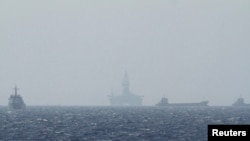Vietnam is exploring the launch of an international arbitration case against China over a series of mishaps in a disputed sea if diplomacy fails, analysts believe.
Over the past six years, Beijing has authorized the placement of an oil rig in contested South China Sea waters and Vietnam has begun exploring for undersea energy in spots that Beijing considers sensitive.
In April a Chinese survey vessel sank a Vietnamese fishing boat. Vietnamese officials claim the sea’s Paracel Islands belong under their flag, though China has controlled the archipelago since the 1970s.
The Philippines, which spars with China over other tracts of the 3.5 million-square-kilometer sea, won world court arbitration in 2016. The tribunal found that China had no legal basis to its claims to about 90% of the waterway including tracts east of Vietnam. China rejected the outcome and stuck to its course but spent the next year improving economic relations in Southeast Asia.
“Through my own assessment of it, [for Vietnam] I think it’s probably one of the more palatable options,” said Derek Grossman, senior analyst with the Rand Corp. research institution in the United States. Whenever China offends Vietnam at sea, he said, “they get really, really apoplectic and then they start to think about what are some of the ways they can push back.”
Vietnam and China have been at odds over the sea and their land border for decades, straining relations between the two Communist neighbors. The Chinese oil rig sparked deadly anti-China rioting in Vietnam in 2014.
Vietnamese deputy foreign affairs minister Le Hoai Trung told an international conference in November that “arbitration” and “international litigation” were among the means Vietnam had explored. This year Vietnam contracted a panel of international maritime law specialists to advise the government.
Grossman said he heard earlier this year from a Vietnamese official that the government was considering arbitration.
Foreign ministers from both sides met Sunday to mark an anniversary of a bilateral land border treaty, signaling that diplomacy is alive for now, said Nguyen Thanh Trung, Center for International Studies director at University of Social Sciences and Humanities in Ho Chi Minh City. Vietnam’s role as 2020 chair of the 10-member Association of Southeast Asian Nations (ASEAN) gives it extra clout to push China over maritime issues.
“I think that they still want to rely on the bilateral mechanism and also the multilateral mechanism to settle their disputes between the two countries,” Nguyen said.
Brunei, Malaysia and Taiwan claim all or parts of the sea as well. Governments prize the waterway for natural gas, oil and fisheries as well as marine shipping lanes.
Vietnam should show it has exhausted diplomacy before filing for any arbitration, said Carl Thayer, Southeast Asia-specialized emeritus professor at the University of New South Wales in Australia. The government in Hanoi would look too for a “critical moment” when its dispute with China had “crystallized”, he said.
Arbitration would especially appeal to Vietnam if China declared an air defense zone over the disputed sea, a threat to the activities of other Asian countries.
Diplomacy is “increasingly not effective” because “China is not listening”, said Alexander Vuving, professor at the Daniel K. Inouye Asia-Pacific Center for Security Studies in Hawaii. Vietnam’s military can’t compete with China’s, he added. “That narrows down the viable options that Vietnam can take,” Vuving said.
Vietnam must approach any world tribunal cautiously because some of its holdings in the South China Sea’s Spratly Islands are too tiny to justify establishing an exclusive ocean economic zone around them, scholars caution.
China would react angrily if called to arbitration, Nguyen said. It might scale back economic relations and become more aggressive toward Vietnam at sea, scholars say. The U.N. Convention on the Law of the Sea, a foundation for world arbitration, does not force either side to carry out arbitration results.
But ASEAN could use a Pro-Vietnam arbitration outcome as pressure to make China comply Thayer said. External “maritime powers” such as the United States and Japan would cite the award as a legal basis to push back against China he said.




